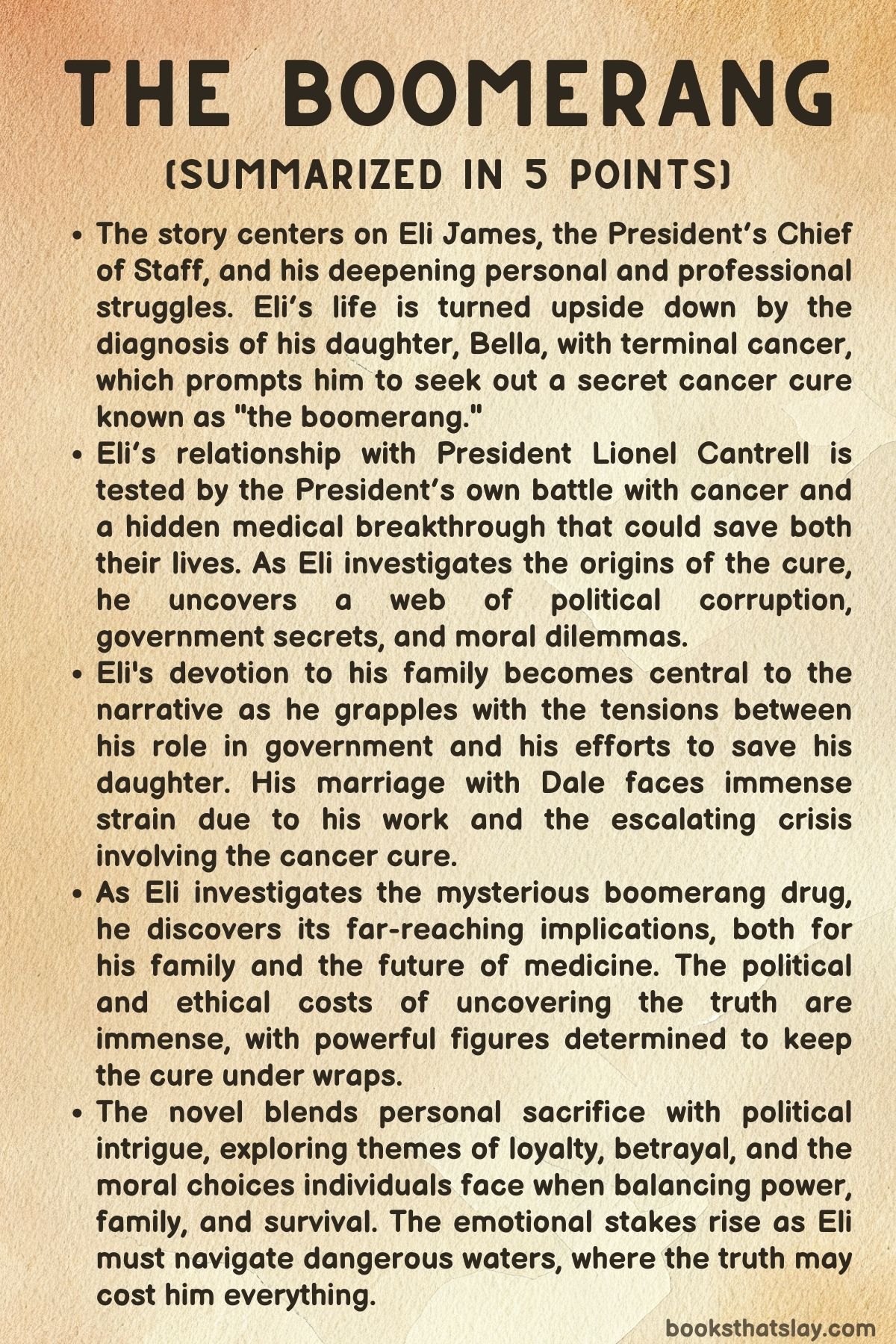The Boomerang by Robert Bailey Summary, Characters and Themes
The Boomerang by Robert Bailey is a compelling political thriller that blends personal sacrifice with high-stakes intrigue. The novel explores the complexities of loyalty, betrayal, and ambition against the backdrop of a groundbreaking medical discovery— a potential cancer cure known as “the boomerang.”
The story follows Eli James, a former Chief of Staff to newly elected President Lionel Cantrell, as he navigates a treacherous path involving government secrets, political manipulation, and personal loss. Central to the narrative is Eli’s struggle to save his daughter from cancer, a journey that forces him to confront moral dilemmas, his family’s safety, and the costs of political power. The novel asks profound questions about ethics, the balance between public duty and personal relationships, and the lengths one will go to in the face of overwhelming obstacles.
Summary
The story begins in 1994, in the small town of Lick Skillet, Alabama, where two teenagers, Lionel Cantrell and Eli James, share a deep bond, their friendship forged on the baseball field. Both dream of achieving greatness— perhaps even becoming president.
The prologue introduces the simplicity of their early lives, which stands in stark contrast to the complications they will face in adulthood. Their shared dreams are encapsulated in the phrase “Lick Skillet forever,” symbolizing their connection and ambition.
Fast forward to 2024, and Lionel Cantrell, now the President-elect, has achieved his dream, but his victory is overshadowed by a dire secret— he has been diagnosed with metastatic colon cancer, which has spread to his pancreas. His condition is worsening, and yet, he must maintain the facade of stability for the nation.
This burden is further complicated by “Project Boomerang,” a covert initiative that involves a revolutionary cancer cure. However, this drug is surrounded by political and ethical complications that threaten not only Lionel’s health but also the stability of his presidency.
Eli James, Lionel’s trusted Chief of Staff and lifelong friend, is caught up in a series of personal and political crises. Eli, who has helped propel Lionel into the political spotlight, is dealing with an investigation into illegal campaign contributions.
Though he is exonerated, the damage to his personal life is already done, especially in his strained marriage to Dale. Their relationship is further tested by Eli’s infidelities, adding to the tension in his personal life.
Additionally, Eli is deeply entangled with Nester Alejandro Sanchez, a powerful businessman who funded Lionel’s campaign. Sanchez’s influence and his ties to the darker side of political power complicate Eli’s efforts to navigate the corridors of power.
As the story progresses, Eli’s world is rocked by the diagnosis of his daughter, Bella, who is diagnosed with a rare and terminal form of cancer. This news devastates Eli and his wife, Dale, as they must confront the emotional toll of their daughter’s illness while also dealing with their crumbling marriage.
Eli’s guilt over his professional actions intensifies as he faces the possibility of losing his daughter. He is torn between his public role and his responsibility to his family, a struggle that will define much of the narrative.
The weight of family trauma becomes more pronounced as Eli investigates potential treatment options for Bella. He is drawn into a morally complex situation involving a secret cancer drug known as the “boomerang.”
This drug has the potential to save Bella’s life, but it is being kept under wraps for reasons that go beyond medical concerns. Eli learns that the drug has been used to treat Lionel’s cancer, a fact that is being hidden from the public for national security reasons.
As Eli digs deeper into the conspiracy, he begins to question the ethics of the government’s actions and the true nature of the forces controlling this life-saving drug.
Throughout the story, Eli’s investigation into the boomerang drug becomes more urgent. He learns from a pharmaceutical lobbyist, Sarah Kate Moss, that the cure for cancer is being suppressed by powerful government officials, including General Kyle Randolph, who fears the chaos that would ensue if the cure were made public.
Eli, desperate to save his daughter, uncovers a web of secrets, including the mysterious death of his father and the disappearance of key figures involved in the “boomerang” project.
As the tension mounts, Eli’s personal and professional lives begin to collide in dangerous ways. He is forced to confront the government’s role in concealing the truth and decides to use his influence and knowledge to obtain the boomerang drug for Bella.
However, his investigation into the conspiracy puts him at odds with powerful figures in the government, including General Randolph, who will stop at nothing to protect the secret.
As Eli navigates this treacherous terrain, he is confronted with difficult choices. Should he pursue the truth, even if it means exposing the government’s wrongdoing and jeopardizing his career and his family’s safety?
Or should he protect his loved ones and allow the conspiracy to remain hidden? The narrative explores Eli’s internal struggle, focusing on the sacrifices he is willing to make for his daughter’s future.
In the climax of the story, Eli takes decisive action to secure the boomerang drug, but his efforts come at a personal cost. As he fights to save Bella, he is pursued by government agents determined to silence him.
In the final moments of the novel, Eli makes a heroic sacrifice, ensuring his family’s safety and securing the future of the boomerang drug. His death becomes a pivotal moment in the story, as his actions lead to the eventual release of the cure to the public.
In the aftermath of Eli’s death, his family is forced into witness protection, and the world must come to terms with the political ramifications of the boomerang’s release. The novel ends with a reflection on the cost of loyalty, power, and the moral compromises made in the pursuit of personal and political success.
Bella, now living with the memory of her father’s sacrifice, must build a future in a world forever changed by the events that transpired.

Characters
Lionel Cantrell
Lionel Cantrell, the President-elect of the United States, is one of the central figures in The Boomerang. His journey represents the intersection of personal and political ambition, highlighting the sacrifices one must make to achieve high office.
A man of great intelligence and ambition, Lionel’s early life, marked by the innocent dreams of a high school athlete, stands in stark contrast to the harsh realities of his presidency. The revelation that Lionel is battling metastatic colon cancer adds a layer of vulnerability to his character, humanizing a figure typically seen as powerful and untouchable.
His role in the story becomes even more complex with the discovery of “Project Boomerang,” a potential cancer cure that he holds in secrecy. This drug, while potentially life-saving, becomes emblematic of the moral compromises Lionel faces as he grapples with the consequences of releasing such information.
Throughout the novel, Lionel’s internal conflict reflects the broader themes of power, secrecy, and the ethical challenges faced by those in high office. His friendship with Eli James, coupled with the strain of his personal health issues, offers a deep look into the emotional costs of leadership.
Eli James
Eli James, the former Chief of Staff to President Cantrell, is perhaps the most morally complex character in The Boomerang. Eli’s character is defined by his deep sense of loyalty and ambition, yet these traits are constantly tested throughout the story.
His relationship with Lionel, shaped by years of friendship and political partnership, adds layers of tension as Eli’s personal struggles begin to clash with his professional duties. At the heart of Eli’s character arc is his desperation to save his daughter, Bella, who is diagnosed with a rare form of cancer.
This personal crisis drives Eli to question his moral boundaries as he becomes entangled in a conspiracy surrounding the “boomerang” drug, a potential cure for cancer that could save Bella’s life but threatens to destabilize both the political and economic order. Eli’s guilt, driven by past political decisions and his role in his family’s crumbling marriage, compounds the weight of his quest.
His investigative journey into the secrets of the cancer cure reveals the darker side of the political world, and Eli’s willingness to sacrifice his own safety and integrity for the sake of his family paints him as both a tragic hero and a man willing to bend or break the rules for those he loves.
Dale James
Dale James, Eli’s wife, is another central character who provides insight into the emotional toll of Eli’s political life and personal struggles. While not as deeply involved in the political machinations of the story, Dale’s perspective is crucial in understanding the personal stakes for Eli.
Her relationship with Eli is strained due to his infidelities and his emotional neglect, especially as the family faces Bella’s diagnosis. Dale is portrayed as a woman who is caught between supporting her husband in his desperate search for a cure for their daughter and dealing with the emotional fallout from their troubled marriage.
Her struggle to cope with both the medical crisis and the growing distance between her and Eli adds emotional depth to the narrative. The strain in their marriage mirrors the larger themes of sacrifice and the consequences of ambition, as Dale is forced to navigate her role as both a mother and a wife, often feeling overshadowed by Eli’s professional and personal turmoil.
Nester Alejandro Sanchez
Nester Alejandro Sanchez plays a pivotal role in The Boomerang, functioning as both a powerful antagonist and a morally ambiguous figure. A wealthy and dangerous businessman, Nester has significant leverage due to his involvement in Lionel Cantrell’s political campaign.
However, it is his connection to the “boomerang” drug that truly defines his character. As someone who holds critical knowledge about the cancer cure, Nester becomes a key player in the moral and political conflicts that drive the plot.
His motivations are unclear at first, but as the story progresses, it becomes evident that his actions are driven by a combination of self-interest, a desire for power, and an understanding of the potential consequences of releasing such a life-altering drug into the world. Nester’s negotiations and manipulations, especially in his interactions with General Randolph and other political figures, reveal his complex character—one who operates in the shadows but holds significant power to sway the future of global healthcare.
Despite his darker traits, Nester’s actions are not entirely villainous, and he seems to genuinely care about the broader implications of the “boomerang” cure, even if his approach to securing its release is less than ethical.
General Kyle Randolph
General Kyle Randolph’s role in The Boomerang is a perfect example of the military-industrial complex’s influence on political affairs. A seasoned and authoritative figure, Randolph embodies the ruthless, calculated nature of the military and governmental powers that seek to control the narrative around the “boomerang” drug.
His involvement in the covert operations surrounding the drug, including his attempts to protect it from becoming public knowledge, marks him as a symbol of governmental secrecy and the lengths to which powerful figures will go to maintain control. His antagonistic relationship with figures like Eli James and Nester Sanchez adds a layer of tension to the plot, particularly as Randolph’s moral compass seems less focused on the well-being of individuals and more on maintaining national security and stability.
His willingness to take extreme measures, including engaging in betrayal and violence, makes him a formidable foe and a key figure in the story’s exploration of power and its corrupting influence. Randolph’s complex personality highlights the tension between public duty and personal ethics, furthering the novel’s themes of moral compromise and survival in a world where personal stakes collide with political realities.
Themes
The Consequences of Political Power
The exploration of political power is central to The Boomerang, where the actions of those in power often have far-reaching consequences. Lionel Cantrell’s ascension to the presidency symbolizes the culmination of a dream, yet it also highlights the inherent risks of wielding such power.
The political landscape, shaped by deals, secrets, and manipulations, creates a tense environment where personal and political ambitions collide. The secretive nature of the “Boomerang” project and the extent to which the government is willing to go to suppress life-saving information underscores the lengths political entities will take to maintain control and power.
The tension between doing what is morally right and protecting national security is a recurring conflict, with characters like Eli James caught in the middle, forced to navigate the delicate balance between their personal convictions and political allegiances. The novel does not shy away from showing the costs of political decisions, illustrating how the lives of ordinary citizens can be upended by the hidden agendas of the powerful.
Loyalty and Betrayal
Loyalty and betrayal form the emotional backbone of the narrative, particularly in the relationship between Eli and Lionel. Their friendship, which began in their youth, is tested by the harsh realities of political life, where secrets, compromises, and hidden motives prevail.
Eli’s loyalty to Lionel as his closest confidante and political ally contrasts with the personal betrayal he experiences in his marriage and his search for the cancer cure. Eli’s desire to save his daughter Bella pulls him deeper into a moral quandary, as his pursuit of the “Boomerang” cure forces him to make decisions that betray the very political system he once served.
His actions, though motivated by love for his family, push him into morally gray areas, showing how loyalty to loved ones can sometimes lead to betrayal of the values one holds dear. The eventual revelation of betrayals, both personal and political, emphasizes how even the most steadfast bonds can unravel under pressure, leading to unforeseen consequences.
The Struggles Between Personal and Professional Life
A significant theme in The Boomerang is the tension between personal obligations and professional responsibilities, particularly as experienced by Eli. Throughout the novel, Eli grapples with the emotional turmoil of his daughter’s terminal cancer diagnosis while simultaneously managing the high-stakes world of politics as Chief of Staff.
His internal conflict mirrors the broader theme of how personal and professional lives often collide, especially for individuals in positions of power. Eli’s investigation into the “Boomerang” cure, driven by his desperation to save Bella, exemplifies how far one might go to reconcile personal loss with professional duties.
This dichotomy underscores the emotional toll that such high-pressure careers place on individuals, pushing them into difficult choices where the boundaries between what is right for their family and what is right for the country are not always clear. The story does not provide easy answers but rather paints a complex picture of how the two spheres can never truly coexist without profound sacrifice.
The Moral and Ethical Dilemmas of Scientific and Medical Advancements
The theme of scientific discovery and the ethical dilemmas surrounding it is woven throughout The Boomerang, particularly with the introduction of the “Boomerang” drug. The potential for a cure for cancer becomes a symbol of hope, but the political and economic implications of such a discovery complicate its release.
The government’s suppression of the drug for national security reasons introduces a moral conflict about the responsibility of those in power to prioritize human life over control. Eli’s quest to secure the cure for his daughter, Bella, illustrates the personal stakes involved in such decisions.
The story raises questions about whether it is right for powerful entities to withhold life-saving treatments for the sake of stability and profit, or if the greater good lies in the unrestricted distribution of such breakthroughs. The moral compromises that characters like Eli are forced to make in the pursuit of truth challenge readers to consider where they would stand in such a high-stakes scenario, testing the boundaries between right and wrong in the pursuit of scientific progress.
Sacrifice and Redemption
Sacrifice is a pervasive theme in the novel, particularly embodied by Eli’s journey. Throughout The Boomerang, characters make difficult choices that require them to give up something valuable—whether it’s their career, their morals, or even their lives.
Eli’s willingness to risk everything, including his career and personal safety, to save his daughter exemplifies the selflessness that is often required in moments of crisis. His eventual martyrdom, in which he sacrifices his life to protect his family, is the ultimate act of redemption.
Eli’s journey is framed by his desire to atone for the mistakes he made earlier in life, especially his role in the political machinations that have tainted his relationships. The theme of redemption is explored through his attempts to reconcile with his past, seeking to do right by his family and his conscience, even at the expense of his own survival.
His sacrifice serves as a poignant reminder that sometimes the only path to redemption is through personal loss, and that the consequences of one’s actions can reverberate far beyond the individual.
The Dangers of Corruption and Secrecy
The theme of corruption and the dangers it brings is intricately explored in The Boomerang, particularly in relation to the “Boomerang” drug and the covert operations surrounding it. The characters in the story operate within a system where secrecy and deception are the norms, and the lines between right and wrong are often blurred.
The government’s role in concealing a potentially life-saving drug highlights the corrupting influence of power, where the protection of national interests and financial gain are prioritized over human lives. Eli’s involvement in uncovering the truth about the drug exposes the deep layers of corruption within both the political and corporate spheres.
The narrative critiques how such secrecy can lead to disastrous consequences, not only for the individuals directly involved but for society as a whole. The theme of corruption is also reflected in Eli’s personal life, where his moral compromises, driven by the desire to save his daughter, mirror the broader ethical decay surrounding him.
Through these interconnected storylines, the novel challenges the idea of transparency and accountability, raising questions about the true costs of secrecy and the price of protecting the status quo.


